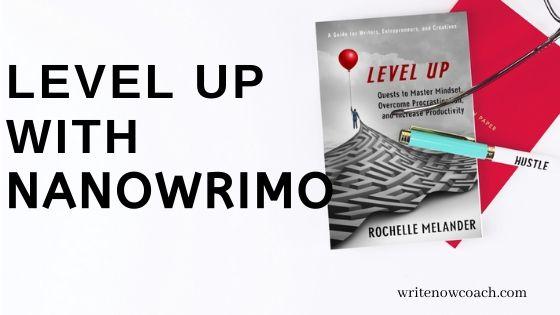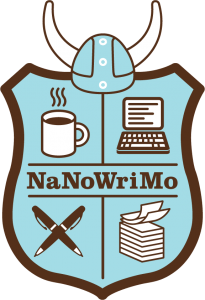Level Up with NaNoWriMo
October 22, 2019
Note From Rochelle
Dear Writers,
Last week, I celebrated the release of my new book Level Up: Quests to Master Mindset, Overcome Procrastination and Increase Productivity. Woot! If you’d still like a Bingo card, post a photo online of you reading the book and email me the link (rochelle (at) writenowcoach (dot) com)
And I’ve decided to offer my Gameify your Writing Life class again on Monday, October 28 at 5:00 PM CT. I’ll be talking about why challenges like NaNoWriMo help us write more. Attend the class live at no charge or purchase the recording later.
Today’s tip talks about how games can help you get more done!
Enjoy!
Rochelle

Level Up with NaNoWriMo
by Rochelle Melander
When You Step Your Game Up, Your Life Will LEVEL UP! –Jeanette Coron

After years of reports on how playing video games will rot your brain, psychologists are now reporting that gaming can be good for us. Why? Because gaming gives us challenges that:
+Build strategy skills
+Tap into creativity
+Increase optimism
+Encourage determination
+Help us make decisions
+Improve focus
On top of that, gaming can be social, which fills our need to connect with other people. Playing games can also improve our mood and memory.
But you don’t have to play video games to benefit from being gameful. You can play cards, board games, and pub games (like pool). Here’s the cool thing: you can bring the elements of gaming into your regular life—and your writing. It’s called being gameful. And it allows us to take the strengths we use when playing games and apply them to the tasks we tackle every day.
Writing challenges like National Novel Writing Month provide the perfect opportunity to be gameful. Here’s how to use game technology to win NaNoWriMo:
Choose your challenge
What writing project are you most passionate about working on right now? Write what delights you: a nonfiction book, a poem a day, a memoir, or even a graphic novel.
Define your epic win
This is your game, so do what works for you. In the NaNoWriMo world, players win when they write a 50,000-word novel in a month. But you can define your own win. Your goal can be writing a nonfiction book, creating an online course, crafting a poetry collection, or drafting a novel.
Design your quests.
 Epic wins are big and scary. Quests are the stepping stones that help you cross the finish line. How will you get to your goal? Will you write for a set amount of time each day, compose a certain number of queries each week, or write a certain number of words a day?
Epic wins are big and scary. Quests are the stepping stones that help you cross the finish line. How will you get to your goal? Will you write for a set amount of time each day, compose a certain number of queries each week, or write a certain number of words a day?
Get allies
When you sign up for National Novel Writing Month, you automatically join a huge community of writers who are tackling the same goal. There are online writing sprints, in-person write-ins, and opportunities for support and camaraderie. Whether you are doing a traditional NaNoWriMo challenge or not, it can be helpful to sign up and join in the fun!
List power-ups
Pac-Man has power pellets, Zelda has bottled fairies and a power bracelet, and Super Mario Brothers has mushrooms. Each of these items helps the character win the day. You’ll need your own list of power-ups to help you achieve your epic win. They might be something as simple as giving yourself a sticker for achieving your daily goal, spending a few minutes on Facebook, or taking a short walk outside. If you need help gathering power-up ideas, last week’s tip was all about power-ups. (https://writenowcoach.com/power-up-and-write-more/)
Identify rewards
We tend to do the things that provide rewards—whether they are tangible, like a participant t-shirt, or intangible, like the feeling of success. Don’t forget to plan a bigger reward to celebrate your epic win.
And the winner is…
 Of course, the real reward of tackling a huge goal like writing a book in a month is … writing a book in a month. Plus, in order to do something big and bold like this, you will build all sorts of amazing muscles: discipline, focus, and creativity. In the end, you’ll have written more than you thought you could and be able to claim with confidence, “I’m a writer.”
Of course, the real reward of tackling a huge goal like writing a book in a month is … writing a book in a month. Plus, in order to do something big and bold like this, you will build all sorts of amazing muscles: discipline, focus, and creativity. In the end, you’ll have written more than you thought you could and be able to claim with confidence, “I’m a writer.”








